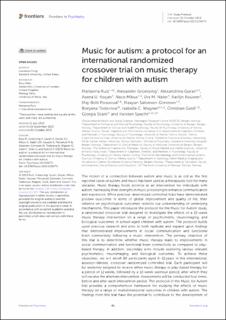| dc.contributor.author | Loria, Marianna Ruiz | |
| dc.contributor.author | Groessing, Alexander | |
| dc.contributor.author | Guran, Alexandrina | |
| dc.contributor.author | Koçan, Asena U. | |
| dc.contributor.author | Mikus, Nace | |
| dc.contributor.author | Nater, Urs M. | |
| dc.contributor.author | Kouwer, Karlijn | |
| dc.contributor.author | Posserud, Maj-Britt Rocio | |
| dc.contributor.author | Salomon-Gimmon, Maayan | |
| dc.contributor.author | Todorova, Boryana | |
| dc.contributor.author | Wagner, Isabella C. | |
| dc.contributor.author | Gold, Christian | |
| dc.contributor.author | Silani, Giorgia | |
| dc.contributor.author | Specht, Karsten | |
| dc.date.accessioned | 2024-01-18T09:39:43Z | |
| dc.date.available | 2024-01-18T09:39:43Z | |
| dc.date.created | 2023-11-02T12:42:53Z | |
| dc.date.issued | 2023 | |
| dc.identifier.issn | 1664-0640 | |
| dc.identifier.uri | https://hdl.handle.net/11250/3112401 | |
| dc.description.abstract | The notion of a connection between autism and music is as old as the first reported cases of autism, and music has been used as a therapeutic tool for many decades. Music therapy holds promise as an intervention for individuals with autism, harnessing their strengths in music processing to enhance communication and expression. While previous randomized controlled trials have demonstrated positive outcomes in terms of global improvement and quality of life, their reliance on psychological outcomes restricts our understanding of underlying mechanisms. This paper introduces the protocol for the Music for Autism study, a randomized crossover trial designed to investigate the effects of a 12-week music therapy intervention on a range of psychometric, neuroimaging, and biological outcomes in school-aged children with autism. The protocol builds upon previous research and aims to both replicate and expand upon findings that demonstrated improvements in social communication and functional brain connectivity following a music intervention. The primary objective of this trial is to determine whether music therapy leads to improvements in social communication and functional brain connectivity as compared to play-based therapy. In addition, secondary aims include exploring various relevant psychometric, neuroimaging, and biological outcomes. To achieve these objectives, we will enroll 80 participants aged 6–12 years in this international, assessor-blinded, crossover randomized controlled trial. Each participant will be randomly assigned to receive either music therapy or play-based therapy for a period of 12 weeks, followed by a 12-week washout period, after which they will receive the alternate intervention. Assessments will be conducted four times, before and after each intervention period. The protocol of the Music for Autism trial provides a comprehensive framework for studying the effects of music therapy on a range of multidimensional outcomes in children with autism. The findings from this trial have the potential to contribute to the development of evidence-based interventions that leverage strengths in music processing to address the complex challenges faced by individuals with autism. | en_US |
| dc.language.iso | eng | en_US |
| dc.publisher | Frontiers | en_US |
| dc.rights | Navngivelse 4.0 Internasjonal | * |
| dc.rights.uri | http://creativecommons.org/licenses/by/4.0/deed.no | * |
| dc.title | Music for autism: a protocol for an international randomized crossover trial on music therapy for children with autism | en_US |
| dc.type | Journal article | en_US |
| dc.type | Peer reviewed | en_US |
| dc.description.version | publishedVersion | en_US |
| dc.rights.holder | Copyright 2023 The Author(s) | en_US |
| dc.source.articlenumber | 1256771 | en_US |
| cristin.ispublished | true | |
| cristin.fulltext | original | |
| cristin.qualitycode | 1 | |
| dc.identifier.doi | 10.3389/fpsyt.2023.1256771 | |
| dc.identifier.cristin | 2191435 | |
| dc.source.journal | Frontiers in Psychiatry | en_US |
| dc.identifier.citation | Frontiers in Psychiatry. 2023, 14, 1256771. | en_US |
| dc.source.volume | 14 | en_US |

